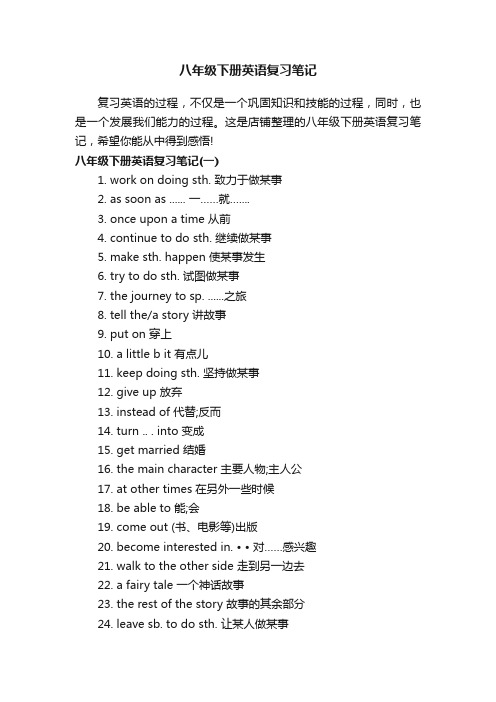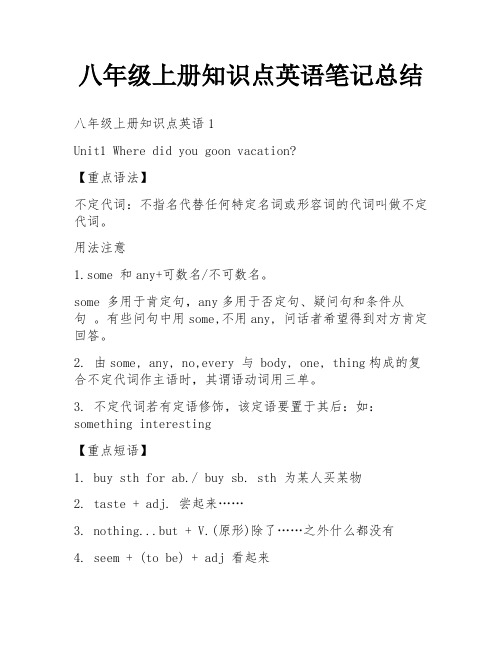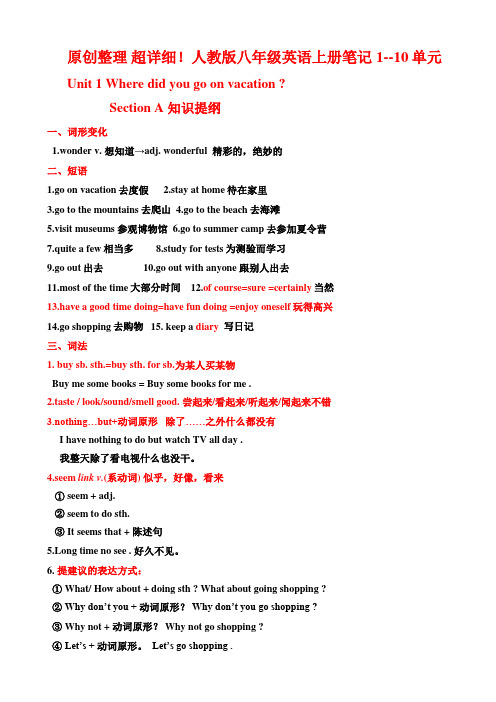八年级英语复习笔记 (1)
人教版八年级英语上册笔记1--10单元

人教版八年级英语上册笔记1--10单元精心整理超详细!人教版八年级英语上册笔记1--10单元Unit 1 Where did you go on vacation ?Section A 知识提纲一、词形变化1.wonder v. 想知道→adj. wonderful 精彩的,绝妙的二、短语1.go on vacation去度假2.stay at home待在家里3.go to the mountains去爬山4.go to the beach去海滩5.visit museums 参观博物馆6.go to summer camp去参加夏令营7.quite a few相当多 8.study for tests为测验而学习9.go out出去 10.go out with anyone 跟别人出去11.most of the time大部分时间 12.of course=sure =certainly 当然13.have a good time doing=have fun doing =enjoy oneself 玩得高兴14.go shopping去购物 15. keep a diary 写日记三、词法1. buy sb. sth.=buy sth. for sb.为某人买某物Buy me some books = Buy some books for me .2.taste / look/sound/smell good. 尝起来/看起来/听起来/闻起来不错3.nothing…but+动词原形除了……之外什么都没有I have nothing to do but watch TV all day .我整天除了看电视什么也没干。
4.seem link v.(系动词) 似乎,好像,看来① seem + adj.② seem to do sth.③ It seems that + 陈述句5.Long time no see . 好久不见。
八年级上册知识点英语笔记

八年级上册知识点英语笔记知识给人以爱,给人以光明,给人以智慧,应该说知识就是幸福,因为有了知识,就是摸到了有史以来人类活动的脉搏,否则就不懂人类生命的音乐!下面小编给大家分享一些八年级上册知识点英语,希望能够帮助大家,欢迎阅读!八年级上册知识点英语1Unit1 Where did you goon vacation?【重点语法】不定代词:不指名代替任何特定名词或形容词的代词叫做不定代词。
用法注意1.some 和any+可数名/不可数名。
some 多用于肯定句,any多用于否定句、疑问句和条件从句。
有些问句中用some,不用any, 问话者希望得到对方肯定回答。
2. 由some, any, no,every 与 body, one, thing构成的复合不定代词作主语时,其谓语动词用三单。
3. 不定代词若有定语修饰,该定语要置于其后:如:something interesting【重点短语】1. buy sth for ab./ buy sb. sth 为某人买某物2. taste + adj. 尝起来……3. nothing...but + V.(原形)除了……之外什么都没有4. seem + (to be) + adj 看起来5. arrive in + 大地方 / arrive at + 小地方到达某地6. decide to do sth. 决定做某事7. try doing sth. 尝试做某事 / try to do sth. 尽力做某事8. enjoy doing sth. 喜欢做某事9. want to do sth. 想去做某事10. start doing sth. 开始做某事=begin doing sth.11. stop doing sth. 停止做某事区分:stop to do sth. 停下来去做某事12. dislike doing sth. 不喜欢做某事14. so + adj + that + 从句如此……以至于……16. tell sb. (not) to do sth. 告诉某人(不要) 做某事17. keep doing sth. 继续做某事18. forget to do sth. 忘记去做某事 / forget doing sth 忘记做过某事【词语辨析】1. take a photo/ take photos 拍照quite a few+名词复数“许多…”2. seem + 形容词看起来…... You seem happy today.seem + to do sth. 似乎/好像做某事 I seem to have a coldIt seems + 从句似乎..…. It seems that no one beli eve you.seem like ... 好像,似乎….. It seems like a good idea.3. arrive in +大地点= get to= reach+地点名“到达......”arrive at +小地点(注:若后跟地点副词here/there/home, 介词需省略,如:arrive here; get home)4. feel like sth 感觉像…feel doing sth. 想要做某事5. wonder(想知道)+疑问词(who, what, why)引导的从句。
八年级上册英语第一单元单词笔记

八年级上册英语第一单元单词笔记一、anyone ['eniwʌn] pron. 任何人。
1. 用法:用于疑问句和否定句中,代替someone。
例如:Did you see anyonein the room?(你在房间里看到任何人了吗?)2. 拓展:在肯定句中通常用someone,但anyone也可用于肯定句中表示“任何人”的意思,强调个体。
二、anywhere ['eniweə(r)] adv. 在任何地方;无论何处。
1. 用法:常与否定词或疑问词连用。
例如:I can't find my book anywhere.(我到处都找不到我的书。
)2. 辨析:与somewhere的区别。
somewhere用于肯定句,表示“某个地方”;anywhere用于否定句和疑问句。
三、wonderful ['wʌndəfl] adj. 精彩的;绝妙的。
1. 用法:用来形容事物非常好、令人赞叹。
例如:We had a wonderful time at the party.(我们在聚会上玩得很开心。
)2. 拓展:同义词有excellent, great等。
四、few [fjuː] adj. & pron. 不多;很少。
1. 用法:- 作形容词时,修饰可数名词复数,表示数量少。
例如:There are few students in the classroom.(教室里几乎没有学生。
)- 作代词时,可单独使用,指代可数名词复数。
例如:Many people came to the party, but few stayed long.(很多人来参加聚会,但很少有人待很久。
)2. 辨析:a few表示“一些,几个”,有肯定含义;few表示“很少,几乎没有”,有否定含义。
五、quite a few相当多;不少。
1. 用法:修饰可数名词复数。
例如:I have quite a few friends here.(我在这里有相当多的朋友。
八年级下册英语复习笔记

八年级下册英语复习笔记复习英语的过程,不仅是一个巩固知识和技能的过程,同时,也是一个发展我们能力的过程。
这是店铺整理的八年级下册英语复习笔记,希望你能从中得到感悟!八年级下册英语复习笔记(一)1. work on doing sth. 致力于做某事2. as soon as ...... 一……就…....3. once upon a time 从前4. continue to do sth. 继续做某事5. make sth. happen 使某事发生6. try to do sth. 试图做某事7. the journey to sp. ......之旅8. tell the/a story 讲故事9. put on 穿上10. a little b it 有点儿11. keep doing sth. 坚持做某事12. give up 放弃13. instead of 代替;反而14. turn .. . into 变成15. get married 结婚16. the main character 主要人物;主人公17. at other times 在另外一些时候18. be able to 能;会19. come out (书、电影等)出版20. become interested in. • • 对……感兴趣21. walk to the other side 走到另一边去22. a fairy tale 一个神话故事23. the rest of the story 故事的其余部分24. leave sb. to do sth. 让某人做某事25. make a plan to do sth. 筹划/计划做某事26. go to sleep 去睡觉八年级下册英语复习笔记(二)1. lead sb. to sp. 把某人领到某地2. get lost 迷路3. change one’s plan 改变计划4. tell sb. to do sth. 叫某人做某事5. in the moonlight 在月光下6. find one’ s way home 找到某人回家的路7. the next day 第二天8. send sb. to sp. 派某人去某地9. as big as 与……一样大10. one of the oldest countries 最古老的国家之一11. feel free to do sth. 随意地做某事12. as far as I know 据我所知13. man-made objects 人造物体14. part of... ...... 的组成部分15. the highest mountain 最高的山脉16. in the world 在世界上17. any other mountain 其他任何一座山18. of all the salt lakes 在所有的咸水湖中19. run along 跨越… …20. freezing weather •冰冻的天气21. take in air 呼吸空气22. the first people to do sth. 第一个做某事的人23. in the face of difficulties 面临危险24. give up doing sth. 放弃做某事25. achieve one’ s dream 实现某人的梦想26. the forces of nature 自然界的力量27. reach the top 到达顶峰28. even though 虽然;尽管29. at birth 在出生的时候30. be awake 醒着31. run over with excitement 兴奋地跑过去32. walk into sb. 撞到某人33. fall over 摔倒34. take care of 照顾;照料35. every two years •每两年36. cut down the forests 砍伐林木37. endangered animals 濒危动物38. fewer and fewer pandas 大熊猫越来越少39. be in danger 处于危险之中40. the importance of saving these animals拯救这些动物的重要性八年级下册英语复习笔记(三)1. W hat do you th in k about/of.. . ?So what do you th ink about the story of Yu Gong?你觉得愚公的故事怎么样?2. It doesn’ t seem adj . to do sth ..I t doesn’ t seem very possible to move -a mountain.把一座山给移掉好像不太可能。
人教版八年级英语上第一、二单元重点笔记

Unit 1 Where did you go on vacation?1.一般过去时:表示过去时间做某事或存在的状态.(1)当谓语动词是be时,其句式如下;a.肯定句:主语+was/were+其它Tom was at home yesterday.b. 否定句:在be 后加not:主语+ was/were+ not+其它.They were not in the USA last summer.c.一般疑问句: Was/Were+主语+其它?---Was Tom at home yesterday? ---Yes, he was./No, he wasn’t.---Were they in the USA last summer? --Yes, they were.. /No, they weren’t.d.特殊疑问句:特殊疑问词+was/were+主语+其它?Where was Tom yesterday? Where were they last summer?(2)当谓语动词是行为动词时,其句式如下:a.肯定句:主语+动词过去式+其它. Gina went to the beach yesterday.b.否定句:主语+ didn’t+动词原形+其它. Gina didn’t go to the beach yesterday.c.一般疑问句:Did+主语+动词原形+其它?---Did Gina go to the beach yesterday? --Yes, she did. /No, she didn’t.d. 特殊疑问句:特殊疑问词+did+主语+动词原形+其它?Where did Gina go yesterday?2. hill小山The house stands on a hill.Mountain大山He wants to see Himalaya mountains (喜马拉雅山).3.go with sb和某人一起去go to +某地+with sb和某人一起去某地Did you go with anyone? I want to go to the mountains with my family.4. some一些,一般用于肯定句和表示委婉语气疑问句中.Any一些,一般用于否定句,疑问句和条件句中.a.常见复合不定代词有:something一些东西, anything一些东西, everything每件东西, nothing没有东西, somebody=someone某人, anybody=anyone某人, everybody=everyone每人, somewhere某地, anywhere某地, everywhere每人地方, nowhere没有地方b.复合不定代词+定语(形容词,动词不定式等)something interesting一些有趣的东西, something to eat一些吃的东西5, few很少,几乎没有,表否定,后接可数名词复数.a few一些,表肯定,后接可数名词复数.quite a few相当多,表肯定,后接可数名词复数.little小的,后可以接可数名词;很少,几乎没有,表否定,后接不可数名词单数.a little有点儿=kind of. 一些,表肯定,后接不可数名词单数.quite a little相当多,表肯定,后接不可数名词单数.I have few good friends. Jim has a few storybooks. There is little water in the bowl.I feel a little tired after school. There is a little water in the bowl.6. most后直接+名词, most people大多数人most of +限定词+名词,作主语时,谓语动词单复数由它所修饰的名词单复数确定.most of后直接+宾格复数代词, most of us我们中大多数人Most of her money was stolen(被偷).Most of her books were stolen.7.反身代词Myself我自己, ourselves我们自己, yourself你自己, yourselves你们自己, himself他自己, herself她自己, itself它自己, themselves他(她,它)们自己8. nothing but除了---外,没有---,只是,仅仅.有时两词还可以分开.There was nothing much to do in the evening but read.晚上除了读书外,就没有许多要做的事.9.decide to do sth决定做某事decide not to do sth决定不做某事We decided to go to the beach near our hotel.10.try to do sth尽力做某事try doing sth尝试做某事Please try to finish this work in thirty minutes.My sister and I tried paragliding.11.feel like+名词/代词/V—ing/句子.觉得,想吃,想做,摸起来像I felt like I was a bird.12. walk与介词搭配的词组有:walk down/ along沿着---走, walk around/ round绕着---走, walk by /past走过,walk across/through步行穿过---, walk into走进---, walk on走---上walk=go for a walk=take/gave a walk散步13.因为because+句子because of+名词/代词/V—ing形式Because I am so tired, I want to have a rest. He isn’t at school because of the illness.14. below 与under区别:(1)两者都可以表示“在---正下方”,不表示正下方,则用below.(2) below表示”少于,低于”,主要用于表示温度,高度以及有纵向标准可比的情况.其它数量方面的“少于”多用under.The temperature is two degrees below zero.温度是零下2度.There were under forty people at the meeting.参加会议的人不足40人.(3)表示一物被另一物覆2,则常用underThe lost city is under the forest.消失的城市就在森林的下面.Unit 2 How often do you exercise?1.how often多久一次how long多长how soon多久以后how far多远2.once一次, twice两次, 三次或三次以上用“基数词+times”.如three times, four times, once aweek一周一次, twice a week一周两次, three times a month一个月三次,one to three times a week一周一到三次, three or four times a week一周三次或四次3.时间频度副词:放在be动词,情态动词,助动词之后;行为动词之前.always总是(100%)›usually通常(75%)›often经常(50%)›sometimes有时(20%)›seldom很少(10%)›hardly ever几乎不(2%)›never从不(0)It is sometimes hot here. I never play computer games.4.every day每天,在句中常作时间状语everyday形容词,日常的,只作定语修饰名词.I go to school by bike every day.It’s no easy to learn everyday English(日常英语).5.health不可数名词,健康healthy形容词,健康的be in good/bad health身体好/不好keep healthy=keep in good health保持健康6.be good for---有益be bad for---有害be good at擅长于be good to—-好be good with---有办法,---相处得好7.here引导的倒装句(1)当主语是名词时用完全倒装.Here+谓语动词+主语(名词).Here goes the bell.铃响了.Here is you letter.Here are my new friends.(2)当主语是代词时,用部分倒装.Here+主语代词+谓语动词.Here it is.它在这儿.Here you are.给你.8.not---at al一点也不,根本不I don’t like the film at all.9.用了“虽然”although,就不要“但是”but; 反之用了but, 就不要although. Although he is rich, he is not happy.10 for example只例举同类的人或事物中的一个例子,后要打逗号。
八年级上册笔记英语

八年级上册笔记英语一、时态:1.一般现在时:一般现在时表示经常发生的动作或状态,常用助动词do 或 does 构成,如:He does his homework every day. 他每天做他的家庭作业。
2.现在进行时:现在进行时表示现在正在进行的动作,常用 am, is, are+ 动词的现在分词构成,如:She is writing a letter. 她正在写信。
3.一般过去时:一般过去时表示过去发生的动作或状态,常用助动词did 构成,如:She did her homework after school.她放学后做了家庭作业。
4.过去将来时和将来时:过去将来时表示过去将要发生的动作,常用助动词 would 构成,如: She said she would finish the paper by Tuesday. 她说她将在星期二之前完成论文。
将来时表示未来将要发生的动作,常用助动词 will 构成,如:He will go to Beijing next week. 他下周去北京。
二、被动语态:1.一般现在时的被动语态:一般现在时的被动语态一般由“助动词be+动词的过去分词”结构构成,如:My book is read by many people. 我的书被很多人阅读。
2.一般过去时的被动语态:一般过去时的被动语态一般由“助动词be+动词的过去分词”结构构成,如:The table was broken by them. 那张桌子被他们弄坏了。
3.一般将来时的被动语态:一般将来时的被动语态一般由“助动词be+动词的过去分词”结构构成,如:This house will be built by us next year. 我们明年将建造这座房子。
三、情态动词:1.有 can, could, may, might, must, ought to, shall, should, will, would 等共11个,它们可以和动词连用,表示对动作的态度,如:He should take more exercise. 他应该多锻炼。
八年级上册知识点英语笔记总结

八年级上册知识点英语笔记总结八年级上册知识点英语1Unit1 Where did you goon vacation?【重点语法】不定代词:不指名代替任何特定名词或形容词的代词叫做不定代词。
用法注意1.some 和any+可数名/不可数名。
some 多用于肯定句,any多用于否定句、疑问句和条件从句。
有些问句中用some,不用any, 问话者希望得到对方肯定回答。
2. 由some, any, no,every 与 body, one, thing构成的复合不定代词作主语时,其谓语动词用三单。
3. 不定代词若有定语修饰,该定语要置于其后:如:something interesting【重点短语】1. buy sth for ab./ buy sb. sth 为某人买某物2. taste + adj. 尝起来……3. nothing...but + V.(原形)除了……之外什么都没有4. seem + (to be) + adj 看起来5. arrive in + 大地方 / arrive at + 小地方到达某地6. decide to do sth. 决定做某事7. try doing sth. 尝试做某事 / try to do sth. 尽力做某事8. enjoy doing sth. 喜欢做某事9. want to do sth. 想去做某事10. start doing sth. 开始做某事=begin doing sth.11. stop doing sth. 停止做某事区分:stop to do sth. 停下来去做某事12. dislike doing sth. 不喜欢做某事14. so + adj + that + 从句如此……以至于……16. tell sb. (not) to do sth. 告诉某人(不要) 做某事17. keep doing sth. 继续做某事18. forget to do sth. 忘记去做某事 / forget doing sth 忘记做过某事【词语辨析】1. take a photo/ take photos 拍照quite a few+名词复数“许多…”2. seem + 形容词看起来…... You seem happy today.seem + to do sth. 似乎/好像做某事 I seem to have a coldIt seems + 从句似乎..…. It seems that no one believe you.seem like ... 好像,似乎….. It seems like a good idea.3. arrive in +大地点= get to= reach+地点名“到达......”arrive at +小地点(注:若后跟地点副词here/there/home, 介词需省略,如:arrive here; get home)4. feel like sth 感觉像…feel doing sth. 想要做某事5. wonder(想知道)+疑问词(who, what, why)引导的从句。
人教版八年级英语上册笔记1--10单元(原创整理,超详细)

原创整理超详细!人教版八年级英语上册笔记1--10单元Unit 1 Where did you go on vacation ?Section A 知识提纲一、词形变化1.wonder v. 想知道→adj. wonderful 精彩的,绝妙的二、短语1.go on vacation去度假2.stay at home待在家里3.go to the mountains去爬山4.go to the beach去海滩5.visit museums 参观博物馆6.go to summer camp去参加夏令营7.quite a few相当多 8.study for tests为测验而学习9.go out出去 10.go out with anyone 跟别人出去11.most of the time大部分时间 12.of course=sure =certainly当然13.have a good time doing=have fun doing =enjoy oneself玩得高兴14.go shopping去购物 15. keep a diary 写日记三、词法1. buy sb. sth.=buy sth. for sb.为某人买某物Buy me some books = Buy some books for me .2.taste / look/sound/smell good. 尝起来/看起来/听起来/闻起来不错3.nothing…but+动词原形除了……之外什么都没有I have nothing to do but watch TV all day .我整天除了看电视什么也没干。
4.seem link v.(系动词) 似乎,好像,看来① seem + adj.② seem to do sth.③ It seems that + 陈述句5.Long time no see . 好久不见。
6. 提建议的表达方式:① What/ How about + doing sth ? What about going shopping ?②Why don’t you + 动词原形?Why don’t you go shopping ?③ Why not + 动词原形? Why not go shopping ?④Let’s + 动词原形。
- 1、下载文档前请自行甄别文档内容的完整性,平台不提供额外的编辑、内容补充、找答案等附加服务。
- 2、"仅部分预览"的文档,不可在线预览部分如存在完整性等问题,可反馈申请退款(可完整预览的文档不适用该条件!)。
- 3、如文档侵犯您的权益,请联系客服反馈,我们会尽快为您处理(人工客服工作时间:9:00-18:30)。
in the faurteurgeo. ing to be
7) _a_re_ you _g_o_in_g__t_o_c_o_m__e(come) and cheer us on the day after tomorgrow up.
二)用法点拨:
▲肯定句结构:1)主+ be going to +V.原 2) there is going to be + 主语 (将有。。。)
(be v. 一般根据主语选用am/is/are)
1)I am going to buy some books tomorrow. 译_我__明__天__要__买_一__些__书________________________ 2)他打算今天下午去拜访她的叔叔 译:H_e__is__g_o_i_n_g_t_o_v_i_s_it_h__is__u_n_c_le__th_i_s_a_f_t_e_rn_o__o_n. 3)他们打算下个星期天去游泳。
英语期末总复习材料Book8 Unit 1 Topic1.
一.语法:一般将来时1. 由“be going to + v.原”构 成` 表示打算、计划、愿意要做的事,或有迹象表明即 将发用来表示自然现象。
一)常见的时间状语: 1)今天下午/晚上__t_hi_s_a_f_te_r_no_o_n__/ _ev_e_n_ing 2)下周/月/明年。。。n_e_xt_w__ee_k__/ m__o_n_th__/ y_e_a_r…… 3)明天__to_m__or_r_o_w_________ 4)后天_t_h_e_d_a_y_a_f_te_r_to_m__o_rr_o_w 5)将来_in__th_e__fu_t_ur_e________ 6) 很快______s_o_o_n________ 7)当某 人长大_w_h_e_n_s_b_g_r_o_w__u_p____ 8) 两天 / 三周 之后_i_n_t_w_o_d_a_y_s_/_t_h_re_e_w__ee_k_s_…_ …
meeti.sI gamoinsgurteo htaek_e___________. 4)Mary and Tina _____w_i_ll_w__in_________ (not go)
shopping tomoarrroewn’tmgoorinnigngto. go 5) There ____________________(be) a clothes
8) What a_r_e_ you __g_o__in_g__to__d_o_ (do) in the future? 9) I _a_m__g_o_i_n_g__to__b_e______ (be) a doctor when I grow up.
二. 重点词句: 二. 重点词句:
1. 使某振作/高兴 1. cheer sb. up
2.在暑假期间
2.during the summer holidays
2. 长大,成长
2. grow up
3. 为。。。效力 3. play for...
4.去骑车
4. go cycling
去登山
go mountain climbing
5. 半小时
5. half an hour
6. 经常做某事
6. do sth much
▲一般疑问句:把__b_e_动__词____ 放在主语前 把上面1)3)句改成一般疑问句 1)_A_r_e_y_o__u_g_o_i_n_g__to__b_u_y_a_n_y__b_o_o_k_s__this afternoon. 3) A__re__t_h_e_y_g_o_i_n_g__to__s_w_i_m__n_e_x_t_S_u_n_d_ay. ▲特殊疑问句: 1)你明天打算做什么? _W__h_a_t _a_re__y_o_u__g_o_in_g__t_o_d_o__to__m_o_r_r_o_w_?___ 2)他下个星期天要做什么? _W__h_a_t _is__h_e_g_o_i_n_g__to__d_o__n_e_x_t _w_e_e_k_?______
Th_e_r_e_i_s_g_o__in_g__to__b_e__m_o_r_e_s_t_u_d_e_n_t_s in our school.
▲否定句:在_b_e_动__词_____后加___n_o_t 把上面1)2)句改成否定句: 1)_I_a_m__n_o_t_g_o__in_g__to__b_u_y__a_n_y_b_o_o_k_s__this afternoon. 2) _H_e__is_n_’_t _g_o_in__g_t_o_v_i_s_it_h__is__u_n_c_le__th_is afoin
参加(活动)
take part in
8. 擅长某事/做某事 8. be good at sth / doing sth
9. 跳远
9. the long jump
跳高
the high jump
10.到达某地(+大地点)10. arrive in…
译:T_h__e_y_a_r_e_g_o_i_n_g__to__s_w_i_m__n_e_x_t_S_u_n_d_a_y_.____ 4)明天将有一场足球赛。
T_h_e_r_e_i_s_g__o_in_g__to__b_e__a_s_o_c_c_e_r_t_o_m__o_rrow. 5)我们学校将会有更多学生。
练习: 1) I _a_m__g_o__in_g__to__v_is_i_t (visit) my aunt this Sunday. 2)___ our school ____________ (have) a sports
meIset next week?going to have 3)Tom ____________ (take) part in the sports
